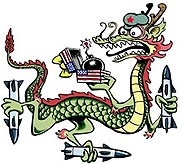|
June 26, 2000 Mission:
Implausible Trading
Places Africa
in Agony Radio
Free Burundi Germany's
New Identity Editorial Appall-O-Meter Mr.
Clean Clash
of the Titan Roma
Wrongs The
Flanders Files Psychlo
Babble All
Things New Summer
Reading |


May 7 marked the anniversary of one of the most fateful episodes of 1999: the U.S. bombing of the Chinese Embassy in Belgrade during NATO's war on Yugoslavia. NATO and the United States apologized for the bombing and called it an accident; China rejected the apology and Washington's explanation - that a "faulty map" led to the "mistaken" bombing.
Until recently, remarkably little serious investigation of the bombing had been undertaken by the American press. This is not the case in Europe. Late last year, the London Observer and Denmark's prestigious Politiken newspaper jointly published an explosive exposť: Sourced to European and NATO officials, the papers charged that the bombing had been a deliberate
 |
|
Credit:
Terry LaBan
|
American act of retaliation against China for its rebroadcasting of Yugoslav military transmissions from within the intelligence wing of its Belgrade embassy (see "A Tragic Mistake?" December 12, 1999).
Now new information has emerged in the American press raising more disturbing questions about how - and why - the attack was carried out.
Following the Observer-Politiken report, the media watch group FAIR called on U.S. newspapers, including the New York Times, to investigate the bombing. At first, Times foreign editor Andrew Rosenthal simply said that his reporters had been unable to confirm the Observer's allegations. But hundreds of readers wrote to the Times calling for an inquiry, and on April 17 the paper finally printed a lengthy investigative story that revealed telling details about the attack.
The Times story can be read on two levels. Superficially, the piece gives the impression that the Observer's charges have proven groundless: "The investigation produced no evidence that the bombing of the embassy had been a deliberate act," the Times reported. But read more closely, Pentagon reporter Steven Lee Myers' piece conveys a nagging sense of doubt about the CIA and Pentagon's protestations of innocence. Myers characterizes the official account of the targeting process as a "bizarre chain" of missteps. And he pointedly ends his article on a skeptical note, citing Rep. Porter Goss (R-Fla.), who was briefed on the bombing by CIA and Pentagon officials: "In the end, he said he was confident in their assurances it had not been a deliberate strike. He paused, then added, 'unless some people are lying to me.' "
Seth Ackerman is a media analyst for FAIR.
![]()
|
In These Times ©
2000
Vol. 24, No. 15 |
